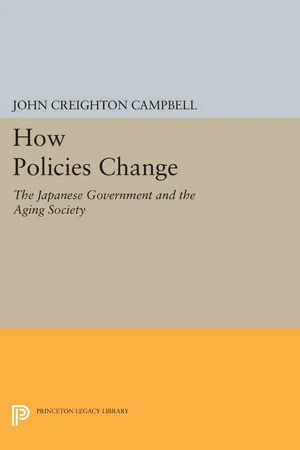
- 438 pages
- English
- PDF
- Available on iOS & Android
About this book
Japan is aging rapidly, and its government has been groping with the implications of this profound social change. In a pioneering study of postwar Japanese social policy, John Creighton Campbell traces the growth from small beginnings to an elaborate and expensive set of pension, health care, employment, and social service programs for older people. He argues that an understanding of policy change requires a careful disentangling of social problems and how they come to be perceived, the invention (or borrowing) of policy solutions, and conflicts and coalitions among bureaucrats, politicians, interest groups, and the general public. The key to policy change has often been the strategies adopted by policy entrepreneurs to generate or channel political energy. To make sense of all these complex processes, the author employs a new theory of four "modes" of decision-making--cognitive, political, artifactual, and inertial. Campbell refutes the claim that there is a unique "Japanese-style welfare state." Despite the big differences in cultural values, social arrangements, economic priorities, and political control, government responsibility for the "aging-society problem" is broadly similar to that in advanced Western nations. However, Campbell's account of how Japan has taken on that responsibility raises new issues for our understanding of both Japanese politics and theories of the welfare state.
Originally published in 1992.
The Princeton Legacy Library uses the latest print-on-demand technology to again make available previously out-of-print books from the distinguished backlist of Princeton University Press. These editions preserve the original texts of these important books while presenting them in durable paperback and hardcover editions. The goal of the Princeton Legacy Library is to vastly increase access to the rich scholarly heritage found in the thousands of books published by Princeton University Press since its founding in 1905.
Frequently asked questions
- Essential is ideal for learners and professionals who enjoy exploring a wide range of subjects. Access the Essential Library with 800,000+ trusted titles and best-sellers across business, personal growth, and the humanities. Includes unlimited reading time and Standard Read Aloud voice.
- Complete: Perfect for advanced learners and researchers needing full, unrestricted access. Unlock 1.4M+ books across hundreds of subjects, including academic and specialized titles. The Complete Plan also includes advanced features like Premium Read Aloud and Research Assistant.
Please note we cannot support devices running on iOS 13 and Android 7 or earlier. Learn more about using the app.
Information
Table of contents
- Cover
- Contents
- List of Tables and Figures
- Preface
- A Note on Conventions
- 1. Introduction
- 2. A Theory of Policy Change
- 3. The Aging Problem: Establishing Pensions
- 4. Policy in the 1960s: The Old-People Problem
- 5. The Old-People Boom and Policy Change
- 6. Starting Small Programs
- 7. New Agenda: The Aging-Society Problem
- 8. Expanding Employment Policy
- 9. Health Care Reform
- 10. Reforming the Pension System
- 11. Conclusions
- Appendix National Programs for the Aged
- Index